Dem-NPL Celebrates Passage of Inflation Reduction Act
As President Biden celebrates Democrats’ Inflation Reduction Act becoming law at the White House today, North Dakota Democratic-NPL leaders reflect on how it will help North Dakotans.
Democratic-NPL Party Chair Patrick Hart lauded, “The Inflation Reduction Act has two amazing highlights that stand out amongst the once in a lifetime changes the Biden Administration delivered on in the first half of the term. First, capping insulin costs at $35 is much needed relief that hits home. These products are produced at less than $10 per unit and have been marketed in the US for over $300. This isn’t patriotic to squeeze citizens for profit. Second, allowing Medicare to negotiate with prescription drug companies will allow a significant reduction of cost for everyone in the supply chain. The fact they couldn’t was a sticking point for Republicans designed to tank the viability of The ACA. This change you will feel at the counter picking up prescriptions. Once again Democrats deliver.”
Senator Tim Mathern of the Health Care Committee remarked, “The Inflation Reduction Act puts a cap on prescription costs for persons on Medicare which will benefit almost 100,000 North Dakotans. This is awesome for our citizens.”
District 4a House Candidate Lisa Finley-DeVille said, “The passage of the IRA is a historic moment for the United States, North Dakota, and Fort Berthold Reservation. The bill provides the much needed tools and incentives to combat climate change, lower prescription drug costs, and other forces driving inflation. This truly is a once in a lifetime law.”
Here’s how North Dakotan’s will be affected:
- Protect Tens of Thousands of North Dakotans from Catastrophic Drug Costs by Capping Medicare Beneficiary Out-of-Pocket Costs in Part D at $2,000. Currently, Medicare beneficiaries with conditions such as cancer, multiple sclerosis, and lung disease can face thousands of dollars in out-of-pocket prescription drug costs, and millions of people in Medicare struggle to afford their medications. The Act will require Part D plans to offer improved financial protections that would phase in starting in 2024, with the $2,000 out-of-pocket cap taking effect in 2025. Each year, that will benefit about 5,200 North Dakota Medicare beneficiaries who would otherwise have out-of-pocket costs above the cap, according to estimates from the Kaiser Family Foundation (KFF). And, for the first time, all 97,000 North Dakotans with Medicare Part D will have the peace of mind of knowing their pharmacy costs are capped.
- Save North Dakota Medicare Beneficiaries Money by Capping Insulin Copays at $35 per Month. Drug manufacturers have raised insulin prices so rapidly over the last few decades that some Medicare beneficiaries struggle to afford this life-saving drug that costs less than $10 a vial to manufacture. Starting in 2023, the legislation will cap the out-of-pocket cost of insulin for Medicare beneficiaries at no more than $35 for a month’s supply. Some 7,000 North Dakota Medicare beneficiaries used insulin in 2020.
- Lower Energy Costs for North Dakotans. The Inflation Reduction Act will make it more affordable for North Dakota families to purchase energy efficient appliances when they need to, make repairs around their homes, and save money on their utility bills each month, through:
- Rebates covering 50-100% of the cost of installing new electric appliances, including super-efficient heat pumps, water heaters, clothes dryers, stoves, and ovens. In North Dakota, hundreds of thousands of low- and moderate-income households are eligible for rebates.
- Rebates for households to make repairs and improvements in single-family and multi-family homes to increase energy efficiency.
- Tax credits covering 30% of the costs to install solar panels and battery storage systems, make home improvements that reduce energy leakage, or upgrade heating and cooling equipment. No income limits apply.
- Tax credits covering 30% of the costs of community solar projects—owned by local businesses that sign up families to save on their electric bills—with additional bonus credits of 20% for projects at affordable housing properties and 10% for projects in low-income communities.
- Grants to help state and local governments adopt the latest building energy codes, which would save the average new homeowner in North Dakota 26.5% on their utility bills—$728 annually.
- Increase Domestic Manufacturing. Manufacturers employ 26,200 workers in North Dakota, and the Inflation Reduction Act will help us make the technologies of the future at home—supporting local economies and strengthening supply chains. The Inflation Reduction Act will boost U.S. manufacturing of clean energy and transportation technologies, as well as investments for a new Advanced Industrial Facilities Deployment Program to position America to lead the growing global market for clean steel, aluminum, cement, and more.
- Create more resilient communities. The Inflation Reduction Act will upgrade affordable housing, including projects that boost resilience in the face of intensifying extreme weather. In North Dakota, thousands of people live in affordable housing units that are eligible for upgrades like flood-proofing and storm resistance, as well as clean energy and electrification. A new Neighborhood Access and Equity Grant Program includes support
for transportation projects and planning to protect against flooding, extreme heat, and more. The Inflation Reduction Act also invests in strengthening America’s forests, including programs focused on preventing wildfires and for tree planting projects that help protect communities from extreme heat.

